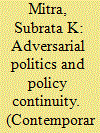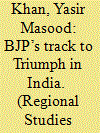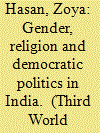| Srl | Item |
| 1 |
ID:
106719


|
|
|
|
|
| Publication |
2011.
|
| Summary/Abstract |
The article seeks to explain the resilience of India's democracy in terms of the persistence of significant legislative output and policy continuity despite noisy adversarial politics. The article analyses this argument on the basis of a comparison of two different national regimes - one by the BJP-led National Democratic Alliance government (NDA), 1999-2004, and the other by the Congress-led United Progressive Alliance (UPA), 2004-2009. Despite their rather different approaches to citizenship - the former, based on Hindu nationalism, and the latter, a more inclusive, 'secular' conception of citizenship - there is considerable convergence in legislative regimes, institutions to safeguard the interest of minorities and public subsidy for the Haj pilgrimage. Turning subjects into citizens - no doubt with a sharp eye to their electoral potential - has become accepted practice by both competing coalitions. Despite its occasional breakdown, the paradoxical juxtaposition of adversarial politics and policy continuity is achieved because of the existence of a broad inter-party consensus on one coherent and meaningful citizenship regime and the high trust in which mediating institutions like the Supreme Court and the Election Commission are held.
|
|
|
|
|
|
|
|
|
|
|
|
|
|
|
|
| 2 |
ID:
135575


|
|
|
|
|
| Summary/Abstract |
The political landscape of India witnessed a historical about-turn when the Bharatiya Janta Party (BJP) decisively ended the decade-long political monopoly of the Indian National Congress (INC). it goes without saying that the unprecedented victory of the BJP in the recent elections has out-distanced even its own major success of 1998. No doubt, there are a number of crucial factors which paved the way for its resounding success. one of course, is the political and ideological vacuum created by the rival INC. this said, however, this paper seeks to uncover other distinct and multifaceted factors which led to the overwhelming rise of the tide of Hindutva, and this despite the fact that India is touted as being a secular and pluralistic democratic state.
|
|
|
|
|
|
|
|
|
|
|
|
|
|
|
|
| 3 |
ID:
098993


|
|
|
|
|
| Publication |
2010.
|
| Summary/Abstract |
This article examines the impact of identity politics on gender equality. More specifically it explores the paradoxical and complex relationship of religion and politics in a multi-religious society and the complicated ways in which women's activism has both reinforced and challenged their gender identities. Contrary to the argument that religious politics does not always negate gender equality, the article argues that the Hindu religious politics and women's activism associated with it provides a compelling example of the instrumentalisation of women to accomplish the political goals of the Hindu right. It also examines the approach and strategies of influential political parties, women's organisations and Muslim women's groups towards legal reform and the contested issue of a uniform civil code. Against those who argue that, in the current communal conjuncture, reform within Muslim personal laws or Islamic feminism is the best strategy for enhancing the scope of Muslim women's rights, the article argues that such an approach tends to freeze identities within religious boundaries. It shows how women's and minority rights are used within the politics of religion to sideline the agenda of women's rights.
|
|
|
|
|
|
|
|
|
|
|
|
|
|
|
|